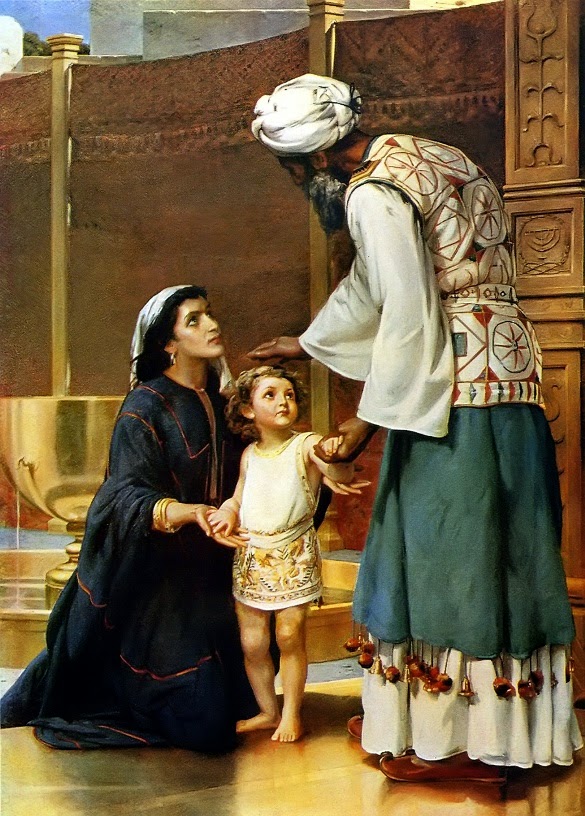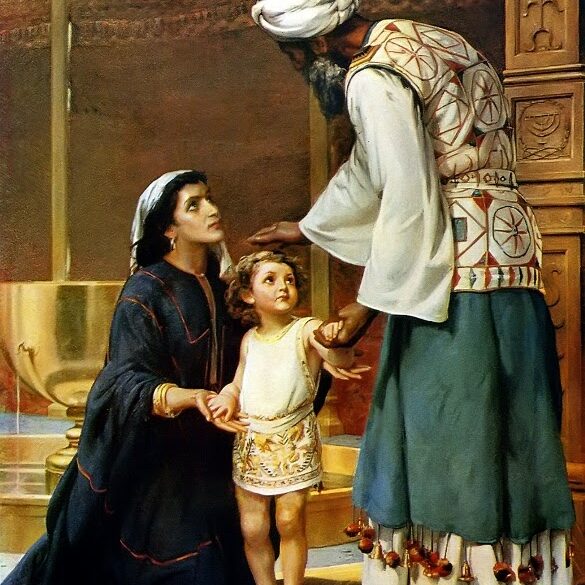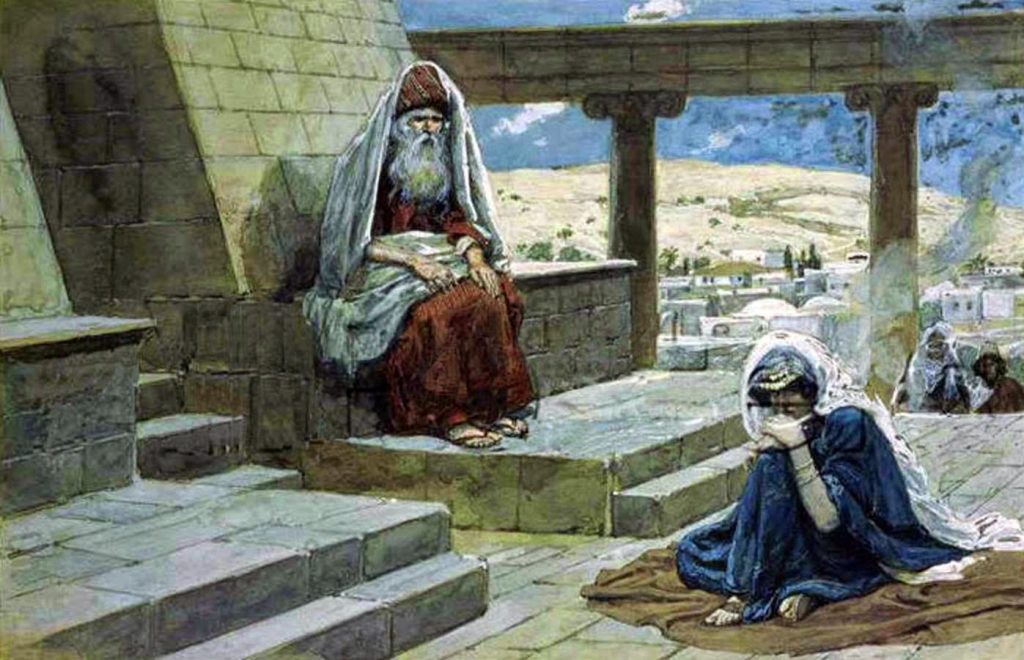 |
| “Samuel Dedicated by Hannah” by Frank Topham |
I’ve always loved Hannah’s story and have been impressed not only with her faith and her integrity, but also with her relationship with her husband Elkanah. He is exceptionally good and compassionate to Hannah in her trial, telling her, “Hannah, why weepest thou? and why eatest thou not? and why is thy heart grieved? am not I better to thee than ten sons? ” (1 Sam. 1:8) Those words indicate to me that Elkanah was trying to remind Hannah that her worth as a woman was not dependent upon her ability to bear children and that she had innate worth, no matter what her situation. In addition Elkanah was unwavering in his support of Hannah’s promise to the Lord to dedicate their son Samuel to the Lord’s service in the temple.
As I studied Hannah’s story this time I made a connection I hadn’t made before about the type of vow that Hannah made to God, and how Elkanah’s support was crucial in her being able to fulfill it. In Numbers 30 it outlines the Mosaic law pertaining to vows made to the Lord. Both men and women were allowed to make vows, or personal covenants to God, but the situations were a bit different for women than for men. For men the law stated,
“If a man vow a vow unto the Lord, or swear an oath to bind his soul with a bond; he shall not break his word, he shall do according to all that proceedeth out of his mouth.” (Numbers 30:2)
For women the law was very similar but gave several exceptions. For example if a woman was in her youth, and still in her father’s house, she could swear a vow but she would only be held to it if her father allowed her to keep her vow. In Numbers 30:3-4 it says,
“And her father hear her vow, and her bond wherewith she hath bound her soul, and her father shall hold his peace at her: then all her vows shall stand, and every bond wherewith she hath bound her soul shall stand.
But if her father disallow her in the day that he heareth; not any of her vows, or of her bonds wherewith she hath bound her soul, shall stand: and the Lord shall forgive her, because her father disallowed her.”
If a woman was married the law was similar. She could make a vow, but the Lord would only hold her to it if her husband supported her in her vow. Numbers 30: 6-8
And if she had at all an husband, when she vowed, or uttered ought out of her lips, wherewith she bound her soul;
And her husband heard it, and held his peace at her in the day that he heard it: then her vows shall stand, and her bonds wherewith she bound her soul shall stand.
But if her husband disallowed her on the day that he heard it; then he shall make her vow which she vowed, and that which she uttered with her lips, wherewith she bound her soul, of none effect: and the Lord shall forgive her.
I thought that this distinction between the laws governing the vows of both men and women was very interesting. For men it was pretty straight forward, if you made a promise to God you better keep it or else you’d be held accountable before God for it. Yet for women the rules weren’t as cut and dry (when are they ever). I think that the Lord understood that women’s situations were often much more complicated because of their dependence upon their fathers and their husbands. Ideally every woman would have had a father or a husband who was righteous and would have supported her in her promises to the Lord, but as we know that wasn’t always the case.
It is interesting that at the end of Numbers 30 the Lord qualifies that if a husband “holds his peace” when he hears his wife make a covenant and allows her to keep it, but then somehow prevents her from fulfilling the promise she made to God, “then he shall bear her iniquity.” (Numbers 30:15) A woman was only held accountable for her vow if she was allowed by the men in her life to keep it, if she was hindered by them then it was the man who would then be held accountable to God for the broken covenant.
I think this is an interesting set of scriptures and I can see how it could still be applicable to women today. Even though many women in today’s world have much more personal autonomy than women did in Old Testament times, I can still think of plenty of situations when a husband or father might hinder a woman from keeping her vow to the Lord. For example, a father who won’t allow his daughter to be baptized, a husband who won’t let his wife pay her tithing, a man who refuses to marry, a husband who won’t support his wife in her callings, a father who won’t let his daughter participate in church activities, or even a husband who refuses to consider another baby when his wife feels that there is another child waiting, can all be examples of unrighteous dominion that might keep a woman from fulfilling her covenants to the Lord.
I think that understanding the Mosaic law concerning vows helps us understand something important about the type of man and husband Elkanah was. He respected and honored his wife and acknowledged her spiritual strength and power. He realized that Hannah had made a sacred vow, a covenant, to God when she went to the temple and prayed for a son. Her promise was that if God granted her the righteous desire of her heart, that she would dedicated her son to God by allowing him to serve in the temple from the time he was a child. I am sure that giving up their son could not have been an easy thing for either of them. Yet, it impresses me that Elkanah stood by Hannah in her covenant, one that she made without him present, and that he not only allowed her to keep it but also made sacrifices in order to make it possible.
I think that this response by Elkanah indicates that he realized that it wasn’t just men who are able to gain revelation, act with spiritual power, or make powerful covenants to God, but that women also have access to the same type of spiritual gifts as men. He seemed to acknowledge and respect his wife’s spiritual power and was supportive of her relationship with God, even if it meant sacrifice on his side. I think that understanding this is an important part of Hannah’s story, because without Elkanah’s support of Hannah’s covenant her story would have been much different, as would the rest of the Old Testament.
The story of Elkanah and Hannah gives us a wonderful example of what a righteous marriage and partnership should look like; one in which both a husband and a wife acknowledge and support the covenants the other has made and both exercise spiritual power. Imagine how different the world would be for women if more marriages, and even father-daughter relationships, were like that.









Thank you for sharing this. What a beautiful example of a righteous marriage partnership.
LOVE THIS!
I can only hope that I find an "Elkanah" some day. 🙂
Great insights as always!